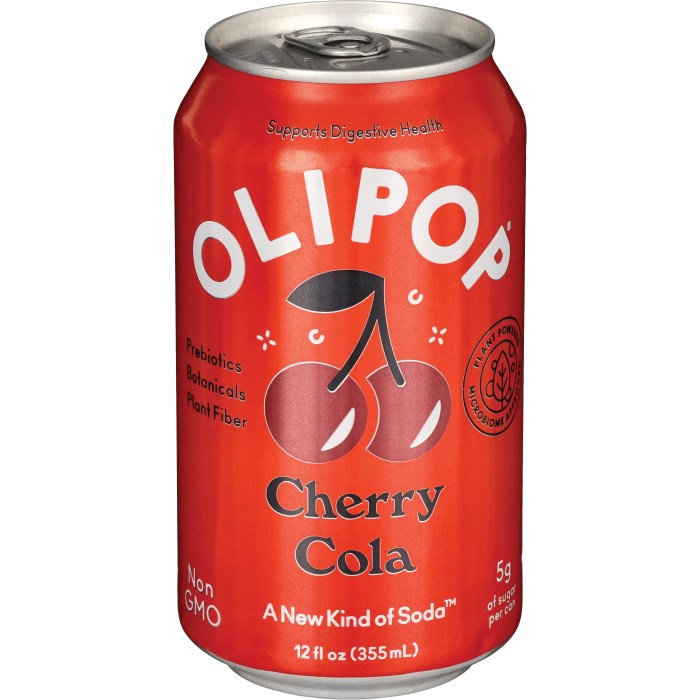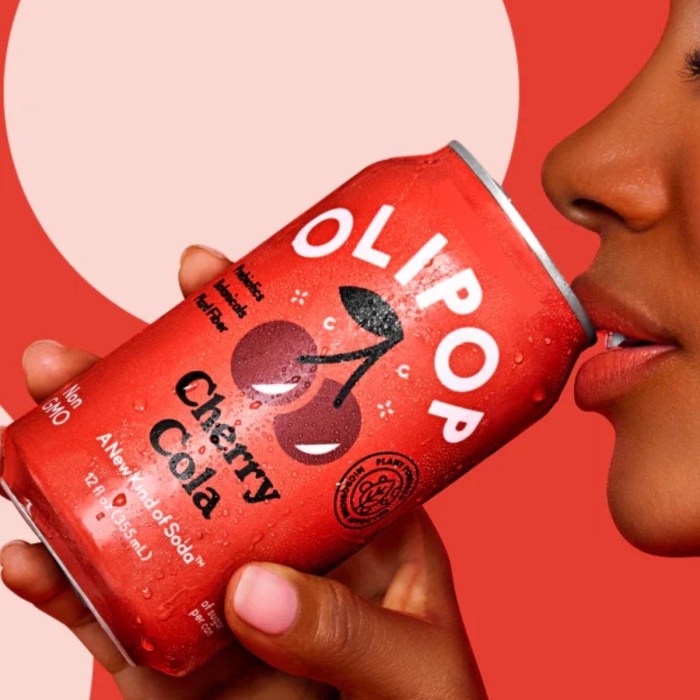Comparison with Traditional Cherry Cola: Olipop Cherry Cola Nutrition Facts

Olipop cherry cola nutrition facts – Let’s face it, the allure of a classic cherry cola is undeniable. That fizzy sweetness, that nostalgic cherry tang… but let’s peek under the hood and see how Olipop’s Cherry Cola stacks up against its sugary counterpart. We’ll delve into the nutritional differences, highlighting how a seemingly simple swap can impact your overall well-being.Olipop Cherry Cola boasts a significantly different nutritional profile compared to your average cherry cola.
The key differentiators lie in the drastically reduced sugar content, the lower calorie count, and the surprising addition of prebiotic fiber. This isn’t just a case of “diet” versus “regular”; it’s a fundamental shift in the ingredients and their effects on your body.
Nutritional Differences Between Olipop Cherry Cola and Traditional Cherry Cola
The stark contrast between Olipop and traditional cherry cola becomes clear when comparing their nutritional information. A typical can of traditional cherry cola is loaded with sugar, providing a quick burst of energy followed by an equally rapid crash. In contrast, Olipop aims for a more sustained energy release, minimizing the sugar rush and subsequent slump.
Dive deep into the delicious world of Olipop Cherry Cola nutrition facts – you’ll be amazed by its prebiotic fiber content! Want a fascinating comparison? Check out the king cake nutrition facts for a wildly different perspective on sugary treats. Then, appreciate even more the healthier, gut-friendly profile of Olipop Cherry Cola; it’s a refreshing choice for your taste buds and your well-being!
- Sugar Content: Traditional cherry colas typically pack 30-40 grams of sugar per serving, whereas Olipop Cherry Cola significantly reduces this amount, usually containing less than 10 grams per serving. This massive reduction directly impacts blood sugar levels and overall calorie intake.
- Calorie Count: A standard cherry cola can easily contain 150-180 calories per can, primarily from sugar. Olipop Cherry Cola significantly lowers the calorie count, typically falling within the 30-60 calorie range per serving. This reduction contributes to better weight management and overall caloric balance.
- Fiber Content: This is where Olipop truly shines. Traditional cherry colas contain virtually no fiber. Olipop, however, incorporates prebiotic fiber, which aids in digestive health and promotes a balanced gut microbiome. A healthy gut microbiome is increasingly linked to improved overall health and well-being.
Implications for Health, Olipop cherry cola nutrition facts
The nutritional differences between Olipop Cherry Cola and its traditional counterpart translate into tangible health implications. The lower sugar and calorie content in Olipop can contribute to better weight management, reduced risk of type 2 diabetes, and improved cardiovascular health. The added prebiotic fiber supports a healthy gut, potentially improving digestion and boosting immunity. While traditional cherry cola offers instant gratification, Olipop prioritizes long-term health benefits by offering a healthier, more mindful alternative.
Consider the cumulative effect of choosing Olipop over traditional soda; small changes over time can lead to significant improvements in overall health and wellness. Think of it as a little act of self-care disguised as a delicious cherry cola.
Health Claims and Scientific Evidence

Olipop Cherry Cola positions itself not as a mere soda alternative, but as a functional beverage promoting gut health. Understanding the scientific basis behind these claims is crucial for discerning whether Olipop lives up to its marketing. This section delves into the specific health claims associated with Olipop Cherry Cola and examines the supporting scientific evidence.
Olipop’s Health Claims and Supporting Evidence
Olipop’s primary health claim revolves around its prebiotic fiber content and its purported positive impact on gut health. The company emphasizes the role of these fibers in supporting a balanced gut microbiome, potentially leading to improved digestion and overall well-being. However, it’s important to critically evaluate the scientific literature to determine the extent to which these claims are substantiated.
- Improved Digestive Health: Olipop highlights the potential for its prebiotic fibers to improve digestion by promoting the growth of beneficial gut bacteria. Studies have shown a correlation between prebiotic intake and reduced symptoms of digestive discomfort, such as bloating and constipation. For instance, a meta-analysis published in the
-Journal of Clinical Gastroenterology* demonstrated that prebiotic supplementation significantly improved stool frequency and consistency in individuals with constipation.However, the effectiveness can vary based on individual factors and the specific type and amount of prebiotic consumed.
- Gut Microbiome Modulation: Olipop suggests that its prebiotic blend helps modulate the gut microbiome, fostering a more diverse and balanced community of microorganisms. Research consistently supports the role of prebiotics in shaping the gut microbiome composition. Studies using 16S rRNA gene sequencing have revealed shifts in microbial communities after prebiotic intervention, often leading to an increase in beneficial bacteria like
-Bifidobacteria* and
-Lactobacilli*.However, the specific changes observed can be highly individual-dependent, making it challenging to predict the exact effects in every person.
- Improved Overall Well-being: While Olipop doesn’t explicitly claim to cure or prevent diseases, the company suggests that a healthier gut microbiome can contribute to improved overall well-being. This is based on the growing body of research linking the gut microbiome to various aspects of health, including immune function, mental health, and even metabolic processes. However, it’s crucial to note that this is a complex area of research, and more studies are needed to fully understand the precise mechanisms and extent of these connections.
While correlations exist, direct causation often requires further investigation.
The Role of Prebiotics and Fiber in Gut Health
Prebiotics are non-digestible food ingredients that selectively stimulate the growth and/or activity of beneficial bacteria in the gut. They act as “food” for these bacteria, promoting their proliferation and contributing to a healthier gut ecosystem. Dietary fiber, a major source of prebiotics, plays a crucial role in maintaining gut health. It adds bulk to the stool, promoting regular bowel movements and preventing constipation.
Moreover, fiber fermentation by gut bacteria produces short-chain fatty acids (SCFAs), such as butyrate, propionate, and acetate, which have various beneficial effects on gut health and overall well-being. For example, butyrate is a primary energy source for colonocytes (cells lining the colon) and has anti-inflammatory properties. Numerous studies have demonstrated the positive effects of fiber and prebiotic intake on gut health, supporting Olipop’s claims to some extent, but individual responses can vary.
Query Resolution
Is Olipop Cherry Cola suitable for diabetics?
While Olipop Cherry Cola has less sugar than traditional colas, it still contains sugar. Diabetics should monitor their blood sugar levels carefully after consumption and consult their doctor or a registered dietitian to determine its suitability within their individual dietary plan.
Does Olipop Cherry Cola contain caffeine?
The caffeine content of Olipop Cherry Cola varies depending on the specific flavor. Check the product label for the most accurate information.
Is Olipop Cherry Cola gluten-free?
Yes, Olipop Cherry Cola is generally considered gluten-free. However, always check the product label to confirm as manufacturing processes can change.
Where can I buy Olipop Cherry Cola?
Olipop Cherry Cola is available online through their website and at select retailers. Check their website for a store locator.